Don't wanna be here? Send us removal request.
Text
How to Prepare Full-Stack Developer Interview Questions
Preparing for a Full Stack Developer interview requires a well-rounded understanding of both front-end and back-end technologies, as well as problem-solving skills and knowledge of industry best practices.

How to prepare for Full Stack Developer interview questions:
1. Master the Basics:
Ensure a strong foundation in fundamental web development technologies, including HTML, CSS, and JavaScript. Understand the Document Object Model (DOM) and how to manipulate it.
2. Front-end Frameworks:
Familiarize yourself with popular front-end frameworks such as React.js, Angular, or Vue.js. Be ready to showcase your ability to build interactive and responsive user interfaces.
3. Back-end Technologies:
Brush up on server-side languages like Node.js, Python, Ruby, or Java. Understand how to handle server-side logic, connect to databases, and manage data efficiently.
4. Databases:
Gain proficiency in database management systems like MySQL, MongoDB, or PostgreSQL. Be prepared to discuss database design, normalization, and the advantages of different types of databases.
5. APIs and RESTful Services:
Understand how to create and consume APIs. Be familiar with RESTful services and how to integrate them into your applications.
6. Version Control:
Demonstrate proficiency in using Git for version control. Understand branching, merging, and resolving conflicts.
7. Deployment and Server Management:
Know how to deploy applications to servers and manage server configurations. Familiarize yourself with hosting platforms like AWS, Heroku, or DigitalOcean.
8. Problem-solving and Algorithms:
Expect to encounter algorithm and data structure questions. Practice solving coding challenges on platforms like LeetCode or HackerRank.
9. Testing and Debugging:
Be prepared to discuss testing methodologies and tools. Understand the importance of writing clean, maintainable code and debugging effectively.
10. Soft Skills:
Full Stack Developers often work in collaborative environments. Showcase your communication skills, teamwork, and ability to explain complex technical concepts to non-technical stakeholders.
11. Stay Updated:
Keep up with industry trends and emerging technologies. Stay informed about the latest updates in front-end and back-end development to demonstrate a commitment to continuous learning.
12. Portfolio and Projects:
Prepare a portfolio showcasing your projects. Be ready to discuss the challenges you faced, the decisions you made, and the impact of your work.

Preparing for a Full Stack Developer interview requires a comprehensive approach that covers both technical and non-technical aspects.
Here's a guide to help you prepare effectively:
1. Review Job Requirements:
Carefully read the job description to understand the specific technologies and skills the company is looking for. Tailor your preparation accordingly.
2. Strengthen Fundamentals:
Ensure a solid understanding of HTML, CSS, and JavaScript. Review concepts like closures, promises, and asynchronous programming.
3. Front-end Technologies:
Master at least one front-end framework (React.js, Angular, or Vue.js) and be able to build responsive, interactive user interfaces.
4. Back-end Technologies:
Brush up on server-side languages (Node.js, Python, Ruby, Java) and understand how to handle server-side logic, work with databases, and manage data efficiently.
5. Database Management:
Understand various database systems (MySQL, MongoDB, PostgreSQL) and be able to design and optimize database schemas. Know how to write efficient queries.
6. API and RESTful Services:
Be familiar with creating and consuming APIs. Understand RESTful principles and how to integrate third-party services into your applications.
7. Version Control:
Practice using Git for version control. Understand branching, merging, and resolving conflicts.
8. Deployment and Server Management:
Know how to deploy applications to servers and manage server configurations. Familiarize yourself with cloud platforms like AWS, Heroku, or DigitalOcean.
9. Algorithms and Data Structures:
Practice solving algorithmic problems and data structure challenges. Understand time and space complexity.
10. Testing and Debugging:
Be prepared to discuss testing methodologies, including unit testing and end-to-end testing. Understand debugging techniques.
11. Soft Skills:
Develop strong communication and collaboration skills. Be ready to explain your thought process, listen actively, and ask clarifying questions.
12. Behavioral Questions:
Anticipate questions about your problem-solving approach, how you handle challenges, and your experience working in teams. Prepare examples from your past projects.
13. Industry Trends:
Stay updated on industry trends, emerging technologies, and best practices. Show that you are engaged in continuous learning.
14. Portfolio Showcase:
Have a portfolio of projects ready to showcase. Discuss the challenges you faced, decisions you made, and the impact of your work.
15. Mock Interviews:
Practice with mock interviews to simulate real interview conditions. This helps you get comfortable with articulating your thoughts and solving problems under pressure.
16. Company Research:
Research the company's tech stack and recent projects. Tailor your responses to align with the company's specific needs and technologies.
17. Stay Calm and Positive:
Maintain a positive attitude and stay calm during the interview. If you encounter a challenging question, approach it methodically and communicate your thought process.
By combining technical proficiency with effective communication and problem-solving skills, you'll be well-prepared for a Full Stack Developer interview. Remember to stay adaptable and open to learning throughout the process. Good luck!
Conclusion:
Preparation for a Full Stack Developer interview involves a combination of technical knowledge, problem-solving skills, and effective communication. By focusing on mastering both front-end and back-end technologies, understanding best practices, and staying up-to-date with industry trends, you can approach the interview with confidence and increase your chances of success.
0 notes
Text
Full Stack Developer Jobs And Salary
Introduction:
In the ever-evolving landscape of technology, Full Stack Developers have emerged as key players capable of handling both front-end and back-end development. This versatile role requires proficiency in a wide array of technologies and has become increasingly sought after by companies looking to streamline their development processes. In this article, we'll delve into the responsibilities of a Full Stack Developer and explore the salary trends associated with this dynamic profession.
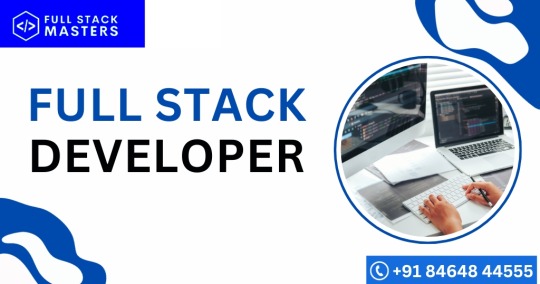
Responsibilities of a Full Stack Developer:
Front-end Development:
Full Stack Developers are adept at creating visually appealing and user-friendly interfaces. They utilize languages such as HTML, CSS, and JavaScript to design and implement the client side of applications.
Back-end Development:
On the back end, Full Stack Developers work with server-side languages like Node.js, Python, Ruby, or Java to build the logic and functionality that powers the application.
Database Management:
Full Stack Developers are often responsible for database management, including designing, implementing, and maintaining databases. Knowledge of databases like MySQL, MongoDB, or PostgreSQL is crucial.
Version Control/Git:
Proficiency in version control systems, particularly Git, is essential for tracking changes in the codebase and collaborating with other developers.
APIs (Application Programming Interfaces):
Full Stack Developers integrate third-party services and applications by creating and consuming APIs.
Server Management and Deployment:
Understanding server management and deployment processes is crucial. Full Stack Developers need to be familiar with server configurations, hosting platforms, and deployment strategies.
Salary Trends for Full Stack Developers:
Experience Matters:
Entry-level Full Stack Developers can expect a starting salary that ranges from $60,000 to $80,000 annually. However, as experience grows, so does the earning potential.
Mid-Level Developers:
With 3-5 years of experience, Full Stack Developers can command salaries between $80,000 and $100,000. This bracket often includes professionals who have demonstrated expertise in multiple technologies.
Senior Full Stack Developers:
Those with more than 5 years of experience and a robust skill set can earn well into the six-figure range. Senior Full Stack Developers, especially those in leadership roles, can command salaries exceeding $120,000, with some reaching $150,000 or more.
Factors Influencing Salaries:
Location, industry, and the specific technologies a Full Stack Developer is proficient in can impact salary levels. Tech hubs like Silicon Valley generally offer higher salaries, while remote work opportunities can also influence compensation.
In-Demand Technologies:
Full Stack Developers skilled in in-demand technologies such as React.js, Angular, or Vue.js on the front end, and Node.js or Django on the back end, may find themselves in higher demand and thus, better-compensated roles.
Conclusion:
Full Stack Developer roles are not only challenging but also financially rewarding. As technology continues to advance, companies will continue to seek skilled professionals who can navigate the full spectrum of development tasks. Whether you're just starting your career or looking to level up, a Full Stack Developer role offers a pathway to a dynamic and lucrative career in the tech industry.
0 notes
Text
Full stack developer Jobs in Hyderabad
Fullstack developers are professionals who possess a comprehensive skill set to work on both the front-end and back-end aspects of web and software development. They play a crucial role in creating and maintaining web applications, websites, and software products.

Some key aspects of full-stack developer jobs:
Front-end Development: Fullstack developers are proficient in front-end technologies like HTML, CSS, and JavaScript. They create user interfaces, ensuring a seamless and engaging user experience.
Back-end Development: They also have expertise in back-end technologies, such as server-side scripting, databases, and server management. They work with languages like Python, Ruby, Java, or Node.js to handle server-side logic.
Database Management: Fullstack developers design and manage databases, including data modeling, storage, and retrieval, often using technologies like SQL or NoSQL databases.
Server Management: They configure and maintain web servers, ensuring the efficient functioning of web applications and databases.
Version Control: Fullstack developers use version control systems like Git to collaborate with team members, track changes, and manage code repositories.
API Development: They create and consume APIs (Application Programming Interfaces) to connect the front-end and back-end components of web applications and enable data exchange with external services.
Responsive Design: Fullstack developers are skilled in creating responsive and mobile-friendly web applications that adapt to various screen sizes and devices.
Testing and Debugging: They perform testing, debugging, and troubleshooting to identify and resolve issues in both front-end and back-end components.
Security: Fullstack developers should be aware of security best practices to protect web applications from common vulnerabilities and threats.
Continuous Learning: Staying up-to-date with evolving technologies and industry trends is crucial for full stack developers as the field constantly evolves.
Collaboration: They often work closely with other developers, designers, and project managers to deliver fully functional web applications.
Problem Solving: Fullstack developers are problem solvers who can handle the entire development process, from conceptualization to deployment.
Full-stack developer jobs are in high demand, as they offer the versatility to work on various parts of a project. These professionals can find employment in various industries, including technology companies, startups, e-commerce, and more. The technologies and tools they use may vary based on the job requirements and the company's technology stack.

The roles and responsibilities of a full stack developer can vary depending on the specific job, company, and project requirements. However, here are some common roles and responsibilities associated with full stack developers:
Front-End Development:
Creating and maintaining user-friendly, responsive web interfaces using HTML, CSS, and JavaScript.
Implementing user interface designs and ensuring a consistent and visually appealing user experience.
Optimizing web applications for performance and speed.
Back-End Development:
Developing server-side logic and handling requests and responses.
Building and managing databases, including data modeling, storage, and retrieval.
Implementing server and application security measures.
Server and Database Management:
Configuring and maintaining web servers, including server setup, deployment, and scaling.
Managing and optimizing databases, ensuring data integrity and efficiency.
Setting up and maintaining APIs for data exchange.
Version Control and Collaboration:
Using version control systems like Git to collaborate with team members and manage code repositories.
Coordinating with other developers, designers, and project managers to ensure project success.
API Development:
Creating, maintaining, and consuming APIs to enable data exchange between front-end and back-end components and with external services.
Testing and Debugging:
Conducting thorough testing of web applications to identify and fix bugs and issues.
Debugging and troubleshooting to ensure the reliability and stability of the application.
Security:
Implementing security best practices to protect web applications from common vulnerabilities and threats, such as SQL injection and cross-site scripting (XSS).
Continuous Learning:
Staying updated with evolving technologies and industry trends to ensure the use of the latest tools and best practices in development.
Problem Solving:
Addressing technical challenges and problem-solving throughout the development process.
Developing innovative solutions to meet project requirements and deadlines.
Project Management:
Taking ownership of tasks and meeting project deadlines.
Collaborating with project managers to plan and execute development tasks effectively.
Documentation:
Maintaining clear and comprehensive documentation for code, APIs, and development processes to facilitate knowledge sharing and project continuity.
Quality Assurance:
Ensuring the quality of code and the application as a whole through code reviews, code standards adherence, and best practices.
Full-stack developers are versatile professionals who can work on all aspects of a project, from conception to deployment. They play a crucial role in bridging the gap between front-end and back-end development, ensuring that web applications are functional, visually appealing, and performant. The specific responsibilities may vary, but these roles encompass the core tasks of a full-stack developer.
0 notes
Text
Java Full Stack Developer Course
Java FullStack Developer Course in Hyderabad
Java Full Stack Developer Course is a comprehensive training program designed to equip individuals with the skills and knowledge necessary to excel in both front-end and back-end web development using Java as the primary programming language. This course covers a wide range of technologies and tools, enabling students to build complete web applications from start to finish.

Key components of a Java Full Stack Developer Course often include:
Front-end Development: Learning HTML, CSS, and JavaScript for creating responsive and user-friendly interfaces.
Back-end Development: Teaching server-side programming using Java and frameworks like Spring Boot, and exploring databases such as MySQL or PostgreSQL.
Version Control: Familiarizing students with tools like Git and GitHub for collaborative coding and code management.
Web Frameworks: Introducing popular Java-based web frameworks for back-end development and front-end frameworks like React, Angular, or Vue.js.
API Development: Covering the creation and consumption of APIs to enable communication between the front-end and back-end of web applications.
Database Integration: Learning to design data models and perform database operations, such as CRUD (Create, Read, Update, Delete).
Authentication and Authorization: Implementing user authentication and access control for web applications.
Deployment and Hosting: Exploring the process of deploying web applications on cloud platforms like AWS, Heroku, or others.
DevOps: Basic DevOps concepts for continuous integration and deployment (CI/CD) to streamline the development process.
Java Full Stack Developer Course provides a well-rounded education, enabling graduates to work on various aspects of web development and become proficient in client-side and server-side programming using Java. This skill set is highly sought after in the tech industry, making it a valuable and versatile career choice for those who want to work with Java in web development.
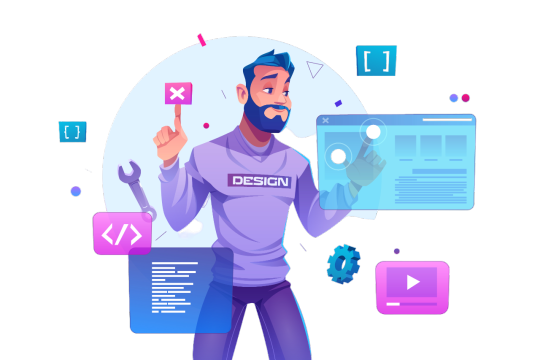
Learning a Java Full Stack Developer Course offers several benefits that can enhance your career prospects in web development and software engineering.
key advantages:
Versatility: Java is a versatile and widely used programming language. Learning Java for both front-end and back-end development makes you versatile and capable of working on a variety of web projects.
Career Opportunities: Java Full Stack Developers are in high demand, and completing a course in this field opens up numerous job opportunities in web development, software engineering, and more.
Strong Community and Resources: Java has a large and active developer community, offering a wealth of resources, libraries, and frameworks to support your development work.
Structured Development: Java enforces structured and organized development practices, leading to cleaner, more maintainable code. This is especially beneficial for large-scale projects.
Component-Based Architecture: Java web frameworks often use a component-based architecture, encouraging the creation of reusable and modular components, which simplifies application management and scalability.
Dependency Injection: Understanding and implementing dependency injection in Java is a fundamental concept for managing and sharing services and data across an application.
Database Integration: Learning how to interact with databases is crucial for web development. Java Full Stack Developer Courses often cover data modeling and CRUD (Create, Read, Update, Delete) operations.
Front-end and Back-end Skills: You'll gain expertise in both front-end (HTML, CSS, JavaScript) and back-end (Java, Spring Boot) development, making you a well-rounded developer.
Spring Framework: Many Java Full Stack Developer Courses include the Spring framework, a powerful tool for building robust and scalable Java-based applications.
Cross-Platform Development: Java can be used for cross-platform development, allowing you to create web applications and mobile apps using Java-based technologies.
Performance and Scalability: Java's robust performance and scalability features are well-suited for building large and high-traffic web applications.
Continuous Learning: The tech industry is ever-evolving, and Java Full Stack Developer training encourages you to stay updated with the latest technologies, trends, and best practices.
Employability: Java Full Stack Developers are highly employable, and your skills in both front-end and back-end development are in demand in various industries.
In summary, a Java Full Stack Developer Course equips you with valuable and transferable skills, making you a sought-after professional in web development and software engineering. It offers a structured and powerful approach to building web applications, and your proficiency in Java can lead to a wide range of career opportunities. https://fullstackmasters.in/
0 notes
Text
Angular Training
Angular Traning in Hyderabad
Angular training is a specialized program designed to teach individuals how to develop web applications using the Angular framework. Angular is a popular front-end framework maintained by Google that's widely used for creating dynamic and interactive user interfaces.
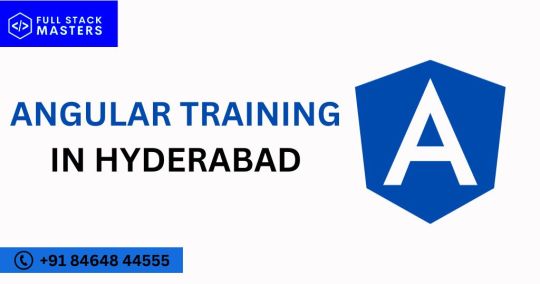
overview of Angular training:
1. Core Concepts: Angular training starts with the core concepts of the framework, introducing you to key concepts like components, modules, templates, and data binding.
2. TypeScript: Angular is built with TypeScript, a statically typed superset of JavaScript. Training often includes a solid understanding of TypeScript, as it's integral to Angular development.
3. Component-Based Architecture: Angular is based on a component-based architecture. Training covers how to design and build components, which are the building blocks of Angular applications.
4. Templates and Directives: You'll learn how to create dynamic views using templates and how to use directives like *ngIf, *ngFor, and custom directives to manipulate the Document Object Model (DOM).
5. Dependency Injection: Understanding dependency injection is crucial for managing and sharing services and data across an Angular application.
6. Routing: Angular training often includes the use of the Angular Router to create single-page applications with multiple views and navigation.
7. Forms: You'll explore the creation of reactive forms and template-driven forms for handling user input and validation.
8. HTTP and APIs: Training covers how to make HTTP requests and work with APIs to fetch and send data to a server.
9. State Management: Advanced Angular training might delve into state management solutions like NgRx for managing the application's state.
10. Testing: You'll learn how to write unit tests for your Angular components and services using tools like Jasmine and Karma.
11. Project Work: Angular training typically involves hands-on projects to reinforce your skills and give you real-world experience in building Angular applications.
12. Best Practices: You'll be introduced to best practices and coding standards to write clean, maintainable, and performant Angular code.
Angular training is essential for web developers who want to create modern, robust, and interactive web applications. It equips you with the skills and knowledge needed to harness the power of Angular and become proficient in front-end web development.
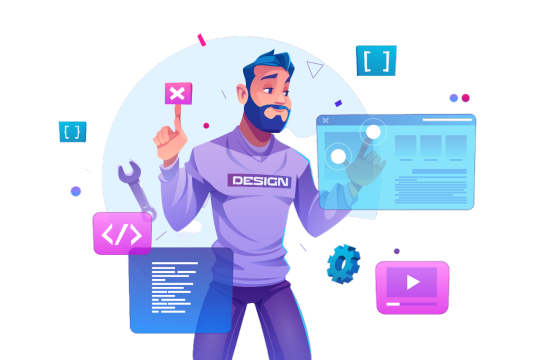
Learning Angular through training offers several benefits that can enhance your skills and career prospects in web development. Here are some of the key advantages of learning Angular:
Career Opportunities: Angular is a widely used front-end framework, and demand for Angular developers is high. Learning Angular can open up numerous job opportunities in web development.
Versatility: Angular is suitable for building a wide range of applications, from single-page applications (SPAs) to complex web platforms. It provides a versatile set of tools for creating interactive and dynamic user interfaces.
Structured Development: Angular enforces a structured and organized development approach, which can lead to cleaner, more maintainable code. This is especially beneficial for large-scale projects.
Component-Based Architecture: Angular's component-based architecture encourages the creation of reusable and modular components, making it easier to manage and scale applications.
TypeScript Proficiency: Learning Angular involves using TypeScript, a statically typed superset of JavaScript. Proficiency in TypeScript can improve code quality and help catch errors at compile time.
Strong Community and Ecosystem: Angular has a large and active developer community. You'll have access to a wealth of resources, libraries, and third-party tools to enhance your development workflow.
Built-In Features: Angular comes with many built-in features, such as routing, dependency injection, and state management (e.g., NgRx). This reduces the need for external libraries and simplifies application development.
Scalability: Angular is well-suited for large and complex applications, offering tools for code splitting, lazy loading, and other performance optimizations.
SEO-Friendly: Angular can be configured to be search engine optimization (SEO) friendly, making it easier for search engines to crawl and index your content.
Cross-Platform Development: Angular can be used for developing web applications as well as mobile applications using frameworks like Ionic and NativeScript.
Internationalization (i18n) Support: Angular provides support for internationalization and localization, allowing you to create applications for a global audience.
Up-to-Date Skills: Learning Angular keeps your skills relevant in the fast-paced field of web development, as the framework is continually updated and improved.
Employability: Angular proficiency enhances your employability and can lead to higher-paying job opportunities in the web development industry.
Continuous Learning: Web development is an ever-evolving field. Angular training encourages continuous learning and staying up-to-date with the latest web development trends and best practices.
In summary, learning Angular through training provides you with valuable skills and expertise that are in high demand in the web development industry. It offers a structured and powerful approach to building web applications, making it a worthwhile investment in your career. https://fullstackmasters.in/
0 notes
Text
Python Full Stack Developer Course
Python full stack developer course in Hyderabad
Python Full Stack Developer Course is a comprehensive training program designed to equip individuals with the skills and knowledge needed to become proficient in both front-end and back-end web development using Python. This course covers a wide range of technologies and tools, enabling students to build complete web applications from start to finish.

Key components of a Python Full Stack Developer Course often include:
Front-end Development: Learning HTML, CSS, and JavaScript for creating responsive and user-friendly interfaces.
Back-end Development: Teaching server-side programming using Python and its frameworks, such as Django or Flask, and exploring databases like PostgreSQL or SQLite.
Version Control: Familiarizing students with tools like Git and GitHub for collaborative coding and code management.
Web Frameworks: Introducing Python web frameworks like Django and Flask for back-end development and popular front-end frameworks like React, Angular, or Vue.js.
API Development: Covering the creation and consumption of APIs to enable communication between the front-end and back-end of web applications.
Database Integration: Learning to interact with databases, including designing data models and performing CRUD (Create, Read, Update, Delete) operations.
Authentication and Authorization: Implementing user authentication and access control for web applications.
Deployment and Hosting: Exploring the process of deploying web applications on cloud platforms like AWS, Heroku, or others.
DevOps: Teaching basic DevOps concepts for continuous integration and deployment (CI/CD) to streamline the development process.
Python Full Stack Developer Course provides a well-rounded education, enabling graduates to work on various aspects of web development and become proficient in both client-side and server-side programming using Python. This skill set is highly sought after in the tech industry, making it a valuable and versatile career choice for those who want to work with Python in web development.
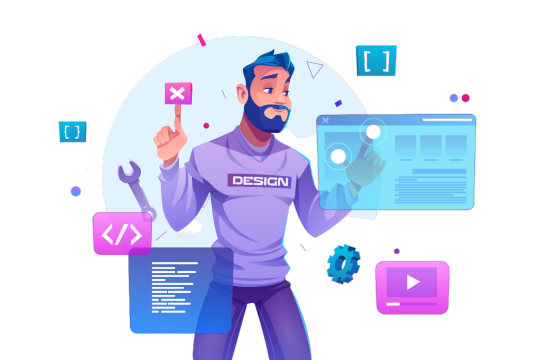
Learning a Python Full Stack Developer course offers several benefits, making it a valuable investment in your career.
Here are some of the advantages:
Versatility: Full Stack Developers are proficient in both front-end and back-end development. Learning Python for both sides of web development makes you versatile and capable of handling various aspects of a web project.
In-Demand Skills: Python is a popular and widely used programming language in the industry. Python Full Stack Developers are in high demand, and the skills acquired in this course are highly transferable to different projects and job opportunities.
Wide Range of Career Options: Upon completing the course, you can explore a variety of career paths, including web development, software engineering, and even data science, as Python is extensively used in these domains.
Strong Community and Resources: Python has a vast and supportive developer community. You'll find a wealth of resources, libraries, and frameworks that can streamline your development work.
Rapid Development: Python's clean and readable syntax allows for faster development, reducing development time and costs for businesses.
Marketability: Being a Full Stack Developer with Python skills enhances your marketability and can lead to higher-paying job opportunities.
Adaptability: Python is used in a wide range of applications, including web development, data analysis, machine learning, and more. Your skills can be applied to diverse projects and industries.
Strong Ecosystem: Python has a robust ecosystem, with frameworks like Django and Flask for web development, and libraries like NumPy, pandas, and scikit-learn for data science and machine learning.
Cross-Training: Learning both front-end and back-end development allows you to understand the entire web development process, fostering better collaboration with team members.
Personal Projects: You can use your skills to work on personal projects, startups, or side ventures, bringing your ideas to life.
Remote Work Opportunities: Many companies offer remote positions, giving you the flexibility to work from anywhere.
Continuous Learning: The tech industry is always evolving. Full Stack Developers with Python skills are encouraged to stay updated with the latest technologies and best practices.
In summary, a Python Full Stack Developer course equips you with versatile and in-demand skills that can lead to a rewarding and diverse career in web development and other tech-related fields. Your proficiency in Python can open doors to a wide range of opportunities and industries. https://fullstackmasters.in/
0 notes
Text
Mern Stack Course
Best Mernstack Course in Hyderabad
MERN Stack Course is a specialized training program that teaches people how to create web applications using a specific collection of technologies and tools. MERN is an acronym that stands for MongoDB, Express.js, React, and Node.js, all of which are essential components of this full-stack web development stack.

Here's a quick rundown of a MERN Stack Course:
1. MongoDB: In a MERN Stack course, you'll learn how to work with MongoDB, a NoSQL database, to store and manage data. This includes creating, querying, and updating databases, making it a foundational skill for back-end development.
2. Express.js: Express.js is a back-end framework for Node.js. In the course, you'll explore how to build server-side applications using Express.js, handling routing, requests, and responses.
3. React: React is a popular front-end library for building user interfaces. You'll learn how to create interactive and dynamic web applications using React, handling components, states, and rendering.
4. Node.js: Node.js is used on the server side to execute JavaScript. In the course, you'll delve into server-side programming with Node.js, handling server requests, and interacting with databases.
5. Full-Stack Development: MERN Stack courses typically cover both front-end and back-end development, enabling you to create complete web applications. You'll understand how to connect the front end (React) and back end (Express.js and Node.js) to build a fully functional web application.
6. RESTful APIs: You'll learn how to design and implement RESTful APIs to enable communication between the front end and back end of your web applications.
7. Database Integration: The course will cover integrating MongoDB into your application, allowing you to store and retrieve data efficiently.
8. Deployment: You'll explore the deployment process, which includes hosting your web applications on cloud platforms like AWS, Heroku, or Netlify.
9. State Management: For React applications, you may also cover state management solutions like Redux or the Context API for handling application state.
MERN Stack development is highly sought after in the tech industry, as it provides a well-rounded skill set for building modern web applications. Upon completing a MERN Stack course, you'll be equipped to work on both the client and server sides of web development, making you a valuable asset for web development projects and potential career opportunities.
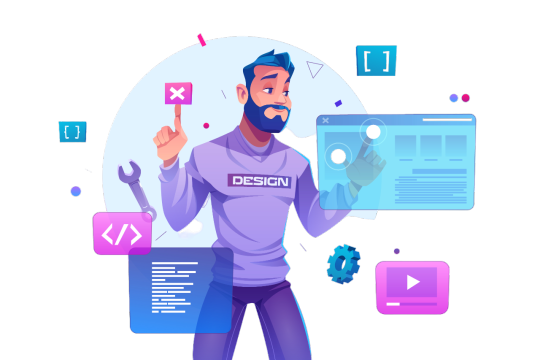
Learning MERN Stack (MongoDB, Express.js, React, and Node.js) offers a versatile skill set that is highly relevant in today's web development landscape. Here are some of the best uses and applications of a MERN Stack course:
Web Application Development: MERN Stack is ideal for building web applications, including single-page applications (SPAs) and more complex projects. You can create feature-rich applications with interactive user interfaces.
Full-Stack Development: MERN Stack developers are proficient in both front-end and back-end development, making them well-rounded and capable of working on all aspects of web applications.
Career in Web Development: Many companies are looking for MERN Stack developers, so completing a course in this stack can lead to various career opportunities in web development.
Freelancing: MERN Stack developers can work as freelancers, taking on a variety of projects and clients, offering flexibility in work and projects.
Startups: If you're interested in entrepreneurial ventures, a MERN Stack course can equip you to create your web-based startup or collaborate with others on their ideas.
E-commerce Development: The MERN Stack is suitable for building e-commerce platforms and online marketplaces, which are in high demand in the digital marketplace.
Web Development Agencies: Many agencies specialize in web development, and MERN Stack developers are highly valued for their ability to create modern, dynamic websites and applications.
Cross-Training: If you're already a developer in another technology stack, learning MERN Stack can broaden your skill set and make you more versatile.
Web Development Projects: You can use your skills to work on personal projects, create your portfolio, or enhance existing websites and applications.
Mobile App Development: You can leverage your knowledge of JavaScript to build mobile applications using frameworks like React Native, which can be cost-effective and efficient.
Contributing to Open Source Projects: MERN Stack developers can contribute to open-source projects, improving their coding skills and giving back to the developer community.
Remote Work: MERN Stack development can often be done remotely, offering flexibility and the opportunity to work from anywhere.
In summary, a MERN Stack course equips you with the skills needed to work on various web development projects and opens up diverse career opportunities in the tech industry. Your ability to create, maintain, and improve web applications will make you a valuable asset in the world of web development. https://fullstackmasters.in/
0 notes
Text
Front End Developer Course
Front End Developer Course in Hyderabad
Frontend Developer Course is a specialized training program focused on teaching individuals the skills and knowledge needed to become proficient in front-end web development. Frontend developers are responsible for creating the user interface and user experience of websites and web applications.
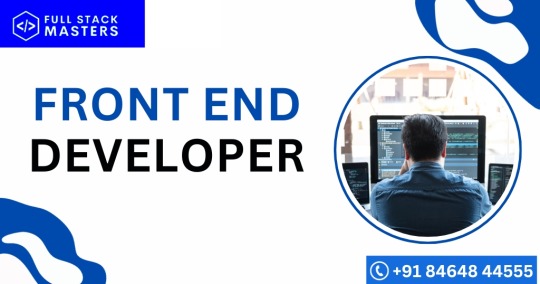
Here's what you can typically expect from a Frontend Developer Course:
HTML, CSS, and JavaScript: These are the foundational technologies of web development. You'll learn how to structure content (HTML), style it (CSS), and make web pages interactive (JavaScript).
Responsive Web Design: Understanding how to create web interfaces that adapt and look good on various devices and screen sizes is crucial for modern frontend development.
Frameworks and Libraries: Courses often introduce popular frontend libraries and frameworks like React, Angular, or Vue.js, which enable you to build complex and interactive web applications efficiently.
Web Performance: Optimization techniques to ensure fast-loading websites, such as minimizing HTTP requests, optimizing images, and leveraging browser caching.
Cross-Browser Compatibility: Strategies for ensuring your web applications work consistently across different web browsers.
User Experience (UX) Design: Basic principles of UX design to create user-friendly and intuitive interfaces.
Version Control: Introduction to tools like Git and GitHub for managing code and collaborating with other developers.
Web Accessibility: Ensuring that web content is accessible to all users, including those with disabilities, by following web accessibility standards.
Testing and Debugging: Learning how to test and debug your code to identify and fix issues in your web applications.
Build and Deployment: Techniques for building and deploying web applications to production servers and cloud platforms.
Continuous Learning: Encouragement to stay updated with the fast-paced changes in the frontend development field.
Frontend Developer Course equips you with the skills needed to create visually appealing and interactive web interfaces. Frontend developers play a crucial role in shaping the user experience, and this course prepares you for a career in web design and development, working on the client side of web applications.
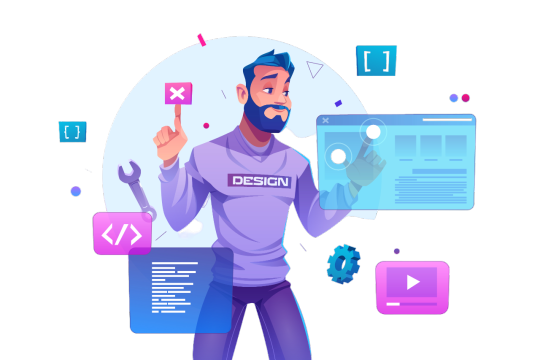
Best uses of learning frontend development:
Web Development Career: The most direct use is pursuing a career as a Frontend Developer. You can work for companies, agencies, or as a freelancer, building and maintaining user-friendly and visually appealing websites and web applications.
Full Stack Development: If you're interested in a broader skill set, you can use your frontend skills as a stepping stone to become a Full Stack Developer. This allows you to work on both the client and server sides of web development.
User Interface (UI) and User Experience (UX) Design: Frontend developers often work closely with designers to implement UI/UX designs. Learning frontend development can lead to roles that involve design implementation and enhancing user experiences.
Specialization: Within frontend development, you can specialize in areas like responsive design, performance optimization, or accessibility, becoming an expert in a specific aspect of web development.
Content Management Systems (CMS): Many websites are built on CMS platforms like WordPress. Frontend developers are in demand to create and customize themes and templates for these systems.
E-commerce: With the rise of online shopping, there's a demand for frontend developers to work on e-commerce websites, ensuring seamless user experiences during the shopping process.
Web Application Development: Many web applications rely heavily on frontend technologies. You can work on building dynamic, interactive web apps using frameworks like React, Angular, or Vue.js.
Mobile App Development: Knowledge of HTML, CSS, and JavaScript can also be applied to developing mobile apps using frameworks like React Native or Ionic.
Cross-Training: If you're already a developer in another domain, learning frontend development can broaden your skill set and make you a more versatile developer.
Freelancing: Frontend developers can work as freelancers, taking on various projects and clients, giving you flexibility in your work and projects.
Personal Projects: Even if you're not looking for a career change, learning frontend development can empower you to create your personal websites or projects, share your interests, or build your portfolio.
Open Source Contributions: Contribute to open-source projects by helping improve their frontend components. This not only enhances your skills but also benefits the broader development community.
In summary, a Frontend Developer course can lead to a diverse range of opportunities, from traditional web development roles to more specialized areas, and even broader career paths like Full Stack Development or UI/UX Design. The skills you gain can be applied to various industries and projects in today's digital world. https://fullstackmasters.in/
0 notes
Text
Fullstack Developer Course
Fullstack Developer Course in Hyderabad
A Full Stack Developer Course is a comprehensive program designed to equip individuals with the skills and knowledge needed to become proficient in both front-end and back-end web development. This course typically covers a wide range of technologies and tools, enabling students to build complete web applications from start to finish.
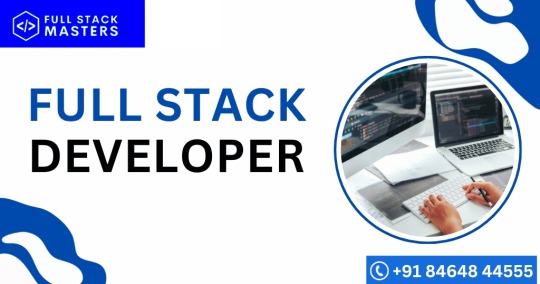
Key components of a Full Stack Developer Course often include:
Front-end Development: Learning HTML, CSS, and JavaScript for creating responsive and user-friendly interfaces.
Back-end Development: Teaching server-side programming using languages like Python, Ruby, Java, or Node.js, and exploring databases such as MySQL or MongoDB.
Version Control: Familiarizing students with tools like Git and GitHub for collaborative coding and code management.
Web Frameworks: Introducing popular frameworks like React, Angular, or Vue.js for front-end development, and Express, Django, or Ruby on Rails for back-end development.
API Development: Covering the creation and consumption of APIs to enable communication between the front-end and back-end of web applications.
Deployment and Hosting: Exploring the process of deploying web applications on cloud platforms like AWS, Heroku, or Netlify.
DevOps: Teaching basic DevOps concepts for continuous integration and deployment (CI/CD) to streamline the development process.
A Full Stack Developer Course provides a well-rounded education, enabling graduates to work on various aspects of web development and become proficient in client-side and server-side programming. This skill set is highly sought after in the tech industry, making it a valuable and versatile career choice.
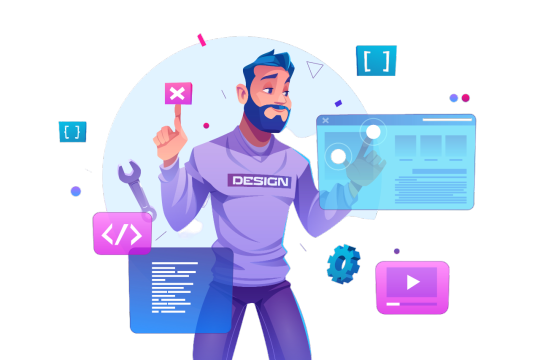
Best uses and applications of a Full Stack Developer course:
Web Development: Fullstack developers are skilled in both front-end and back-end development, allowing them to create complete, feature-rich web applications. This includes building websites, web apps, and e-commerce platforms.
Start Your Own Projects: With a solid understanding of both front-end and back-end technologies, you can bring your own ideas to life. This is especially valuable if you have entrepreneurial ambitions and want to create your own web-based business.
Freelancing: Full Stack Developers often have the flexibility to work as freelancers. You can take on diverse projects for clients, ranging from website design to database development, and enjoy the freedom of setting your own schedule.
Career Advancement: Many companies value Full Stack Developers for their versatility. As you gain experience, you can advance into roles like Lead Developer, Technical Architect, or DevOps Engineer. These positions often come with higher salaries and more responsibility.
Specialize as Needed: While Full Stack Developers have a broad skill set, they can also choose to specialize in either front-end or back-end development if they have a preference. This flexibility allows you to tailor your career to your interests and market demand.
Work for Tech Companies: Tech giants, startups, and established companies are always in need of Full Stack Developers to maintain and enhance their web applications. These jobs often come with competitive salaries and benefits.
Remote Work: Full Stack Development skills can be applied from anywhere with an internet connection, making it an ideal career choice for those who prefer remote work or digital nomadism.
Cross-Training: If you're already a developer (front-end or back-end), learning the other side can make you a more well-rounded and valuable team member. You can understand the entire web development process and collaborate more effectively with your colleagues.
Contributing to Open Source Projects: Full Stack Developers can contribute to open-source projects, improving their coding skills and giving back to the developer community.
Continuous Learning: The tech industry is constantly evolving, and Full Stack Developers need to keep learning to stay updated with the latest technologies. This career path encourages continuous education and personal growth.
In summary, a Full Stack Developer course equips you with a versatile skill set that can lead to a variety of exciting career opportunities in web development and beyond. Your ability to create, maintain, and improve web applications will make you a valuable asset in the tech industry.https://fullstackmasters.in/
1 note
·
View note